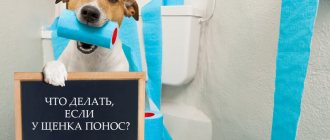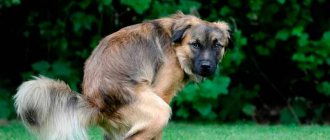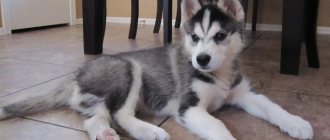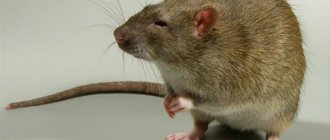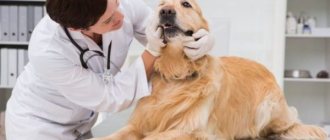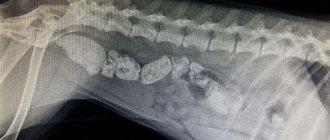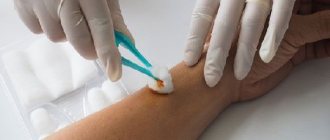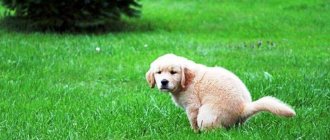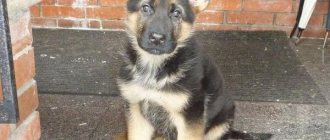Causes of diarrhea in puppies
In newborn puppies, the first few days there is a process of adaptation, this can cause loose stools. There is nothing to worry about as long as the puppies are gaining weight well and appear calm. But the older the puppies get, the more causes of diarrhea there may be.
The most common causes of diarrhea include poor diet, in particular:
- habitual overeating;
- eating too fatty foods;
- sudden transition to another type of food;
- unbalanced diet;
- intolerance to certain food components;
- eating foods that are unsuitable for dogs or spoiled food.
Keep an eye on the puppy while walking - inquisitive kids may pick up and eat something from the ground. These foods often cause stomach upset. A puppy can even eat something completely inedible - for example, washing powder or a piece of construction paper. The danger to life in this case depends on the shape and size of the object.
Be careful, very small puppies do not know how to control their appetite, so when introducing complementary foods, be careful not to give too much.
Diarrhea can also be caused by:
- severe stress;
- change of teeth (starts at approximately 3 months);
- allergies to medications or food;
- worms (sometimes infection occurs in the womb);
- medications that have diarrhea among the side effects;
- vaccination (diarrhea can be observed within 2-3 days after vaccination, no more).
Some of the most serious causes of diarrhea in puppies include:
- intestinal infections;
- bacterial, viral, invasive diseases;
- neoplasms in the gastrointestinal tract.
Important! A single loose stool in a puppy is not a cause for serious concern. But if diarrhea continues for more than a day, it is necessary to take the dog to the veterinarian as soon as possible.
Causes of diarrhea may require immediate medical attention.
Main causes of diarrhea
If your French Bulldog has diarrhea, it can be caused by a number of reasons:
- cold
- intestinal infection
- worms
- teething
If the disease is observed in a puppy, then diarrhea may be associated with some changes in the diet, for example, one type of food was replaced by some other analogue. A puppy's nutrition is an important factor affecting its health. It is necessary to introduce strictly one new product per day into the diet. Then it will be easier to determine what caused the sudden diarrhea.
If the diarrhea is mild, and the dog is active and does not show signs of illness, then you can try to cure the unpleasant symptom with the help of Smecta or activated charcoal. If the disorder worsens, then the dog needs to be taken to the veterinarian.
Forms of diarrhea in puppies
Doctors distinguish between acute and chronic diarrhea in puppies.
In case of acute diarrhea, the dog will diarrhea for no more than 2-3 weeks. This type of diarrhea begins abruptly and disappears just as quickly. Chronic diarrhea is less common and lasts more than 2-3 weeks. It often signals serious problems in the dog’s body.
German Shepherds, South Russian Shepherds, Yorkies, Great Danes, Pinschers, and Bordeaux dogs are especially susceptible to chronic diarrhea. If you adopt a dog of one of these breeds, be prepared for occasional loose stools.
Normal puppy stool is yellowish-brown in color and has a firm, uniform consistency. With diarrhea, the stool becomes liquid or mushy, the color may change, and impurities appear. Pay attention to these details, they will help determine the cause of diarrhea. Also monitor the general condition of the puppy - how weak it is, how much water it drinks, whether its body temperature changes, and what accompanying symptoms are there.
Diarrhea with vomiting
Vomiting is a common symptom accompanying diarrhea. Vomiting once is not a reason to panic if the pet’s general condition does not worsen. Perhaps the puppy just overate. Children have poor control over the process of food absorption and often eat more than necessary, which later results in short-term diarrhea and vomiting. In this case, it is enough to simply skip 1-2 feedings to normalize the condition and give the puppy plenty of water.
Read How and when to deworm dogs and puppies
If vomiting is repeated several times in a short time and exhausts the dog, the matter may be poisoning or ingestion of a foreign object.
In case of poisoning, you need to find out what exactly poisoned the puppy. Poisoning from stale sausage can be survived at home, but if your baby eats laundry detergent or medicine from the box, you need to see a doctor.
When a foreign object gets into the stomach, it also matters what kind of object the dog ate. Often it is impossible to determine, and you have to deal only with the consequences. It is important to avoid two things: intestinal obstruction and damage to internal organs with sharp edges (in this case, diarrhea with blood usually occurs).
Small, smooth objects (such as beads) will pass out of the dog's body on their own. But larger objects can block the exit of feces and simply get stuck inside. If your puppy's diarrhea is replaced by difficulty in defecation or its complete absence, you need to consult a doctor. The veterinary clinic will remove the foreign object from the gastrointestinal tract.
Important! Watch for impurities in both feces and vomit. If your puppy vomits white threads or mucus, contact your veterinarian immediately. These are all signs of serious diseases: parvovirus enteritis, viral hepatitis and others.
If vomiting persists for more than a few days, the cause may be helminths and various infections.
Puppies, subject to both diarrhea and prolonged vomiting, lose a huge amount of electrolytes, so it is important to support their body with water-salt solutions and vitamins.
Diarrhea with blood
Blood in the stool scares owners the most, and for good reason. This is one of the most alarming symptoms, and when it appears, it is better to rush to the veterinary clinic. There may be blood clots or threads in the feces, and the stool may become a relatively uniform pink color. In the most severe cases, blood can practically flow through the feces, and the stool takes on a pronounced bright scarlet color.
Bloody diarrhea can be caused by:
- destruction of several blood vessels as a result of pressure drop;
- mechanical damage from an accidentally swallowed object;
- chemical or drug poisoning;
- many diseases, such as coronavirus enteritis, adenovirosis, canine distemper (colloquially distemper), colibacillosis, etc.
Bloody diarrhea should not be treated at home. Elimination of such diarrhea is carried out in two stages. The first step is to stop the bleeding, then the doctor begins treatment. Depending on the cause of the diarrhea, even surgery may be required - for example, if the pet has swallowed a sharp metal object or it is due to a developing tumor.
Attention! The sooner you take your puppy to the doctor, the greater the likelihood of a favorable outcome. Do not try to treat your pet yourself if you do not stop the bleeding in time - this can lead to the death of the dog.
Diarrhea with mucus
Mucus in stool has two main causes:
- taking antihelminthics (especially if there were a lot of parasites);
- inflammation of the colon.
The worms die when they are excreted from the body, are partially digested and become visible in the feces in the form of a mucous mass.
When inflammation occurs, a large amount of mucus begins to form on the walls of the large intestine. The puppy begins to have frequent urges to go to the toilet, the stool is not formed, the discharge is liquid and mucous.
If your puppy has only had phlegm once, he may have simply eaten something too fatty.
Black diarrhea
Black diarrhea, like pink diarrhea, indicates internal bleeding. The only difference is that black stool occurs when there is bleeding in the upper gastrointestinal tract, and bright scarlet stool occurs in the large and small intestines. The blood has time to be exposed to gastric juice while it is moving from the stomach to the intestines, and due to this, it turns black at the exit.
Read 10 symptoms of allergies in dogs and effective ways to treat the disease
There is a simpler option - ordinary charcoal can give the stool a black color if you gave it to a puppy. Don’t rush to panic if you fed your pet a few charcoal tablets the day before. In other cases, it is better to react immediately.
Actions for black diarrhea are similar to the point about bloody diarrhea.
Yellow diarrhea
Yellow stool may be associated with gastrointestinal or liver problems. The puppy may have eaten something inappropriate the day before or reacted in this way to a change in diet.
If the stool is bright yellow, almost orange, this indicates liver disease and impaired bile production. The puppy may gradually become worse, and as the disease progresses, the stool will become increasingly rich in color.
Green chair
Green stools most often occur due to poisoning from stale food. The puppy could eat rotten, moldy food. The process of rotting and fermentation begins in the intestines. Or the puppy has low-quality food containing a lot of dyes - this option is worth considering if the stool has changed color immediately after switching to another food.
Sometimes stool becomes greenish after taking medications that cause dysbiosis.
Green stools are often accompanied by fever and weakness. In severe cases, when the body cannot cope on its own, antibiotics and immune drugs will be required.
White poop
Bile gives stool its normal yellowish-brownish color. If stool loses its color, becomes gray or even white, most likely the cause is clogged choleretic ducts and various diseases of the gallbladder. Bile does not enter the intestines and accumulates inside. This is considered a dangerous sign.
Depending on the dog's condition, the stool may be:
- gray;
- very light, almost white;
- white-yellow;
- completely colorless, resembling mucus.
Pure white poop can also be a consequence of oncology, so it is better not to delay diagnosis.
Food poisoning can also discolor stool for a short period of time - the body is stressed, recovers, and during this period the production of bile decreases.
Causes of the disease
- Very often, dog owners are faced with the fact that their pet examines the trash can and eats “whatever” or finds “whatever” on the street, under the windows of houses and not only (spoiled food, poison, household chemicals, etc.). ). This is one of the common causes of vomiting in dogs. To avoid bad consequences from such a bad habit, it is necessary to raise and train the dog (the “fu” command).
- Binge eating.
- Quick meal.
- Poor nutrition (use of unhealthy foods).
- Intolerance to certain food components.
- Difficult to digest food.
- A foreign body can cause vomiting if it gets into the stomach or a foreign body gets stuck in the esophagus (bones, needles, splinters, etc.).
- Poisoning.
- Intestinal obstruction.
- Infectious diseases.
- Worms and parasites.
What is vomiting?
Symptoms. Dogs have the ability to heal themselves.
manifestation of the body’s protective reaction, allows you to get rid of harmful food or a foreign body (
, rope, wood chips, needles, etc.), poison, toxic substance, etc.
- This is a reflex eruption of the contents of the stomach. The main symptoms of vomiting in dogs are: nausea, drooling, restlessness, poor appetite, and refusal to eat.
The very manifestation of vomiting in dogs is not an independent disease, it is a symptom of many diseases.
Physiological vomiting in dogs
- Vomiting in dogs caused by overeating. During feeding, the dog should receive food in doses, since most dogs do not know a sense of proportion and they have an excessive appetite. Feed your pet at the same time and follow the dosage (food or natural food), otherwise excessive feeding of the dog will lead to diseases of the digestive system.
- The dog regurgitates puppy food while feeding (semi-digested food).
- Meningitis, encephalitis, abscess, brain tumor are organic disorders of the central nervous system.
- With liver and kidney failure, vomiting in dogs can also be accompanied by diarrhea (diarrhea). The cause may be intoxication with drugs, poisons circulating in the blood during poisoning (carbon monoxide, chlorine, etc.).
- Diseases of the stomach and duodenum (ulcer, gastritis, stomach tumor). Symptoms: nausea, vomiting, abdominal pain. Such gastric vomiting occurs mainly after eating, after 30-60 minutes.
- Diseases (damages) of the intestines, liver and kidneys, inflammation of the peritoneum. Intestinal vomiting occurs as a result of antiperistaltic movement of the intestines, as a result of which the intestinal contents enter the stomach. Symptoms: nausea, then vomiting food, bile and eventually feces.
- Vomiting of blood (with gastrointestinal diseases).
- Vomiting with a nasty smell (the smell of ammonia - with liver failure, a sweet smell - diabetes mellitus, the smell of rotting - a problem in the intestines or mouth).
- Vomiting accompanied by diarrhea (diarrhea) and fever (often with infectious diseases).
- Vomiting and refusal to eat - often due to poisoning.
- The dog eats grass, then vomits - cleansing the stomach.
- Vomiting after eating (after 30-60 minutes or more) – with gastrointestinal diseases.
For a person who is faced with a difficult situation for the first time - vomiting in dogs, it is difficult to independently determine the causes of its occurrence, and there are a lot of them, we strongly recommend not to self-medicate and experiment on your pet - everything can end very badly.
What to do if your dog is vomiting? Be sure to seek help from a veterinarian; you may need to conduct additional tests: x-rays, ultrasound, blood tests, etc. or call a veterinarian at home. Before the veterinarian arrives or before going to the veterinary clinic, under no circumstances scold the dog for dirty things, monitor the general condition of the dog’s body and symptoms.
How to provide first aid if a dog is vomiting?
- Do not give your dog food and water (in large volumes) for several hours, or maybe more than 4 - 24 hours (depending on the cause, frequency of vomiting, as well as the age and physical condition of the animal), as they can irritate the stomach walls and the vomiting will start again. To avoid dehydration, give your dog water only in small portions, 2 teaspoons per 1 kg of dog weight throughout the day. After 24 hours, try giving food in very small portions. If the dog does not vomit anymore, you need to go on a diet for several days.
- If the dog has vomited only once, after which it feels well, eats and drinks, there is no danger, the dog’s body has coped with the problem on its own and from a medical point of view, there is no reason for concern. The cause of one-time vomiting in a dog is the dog’s natural need to rid the stomach of what is there.
- If you were able to identify the cause of vomiting: a sudden change in food (food), during a walk the dog ate grass or picked up garbage, in this case, you need to return to the previous food (food), and the change of food must be carried out gradually, do not let your dog pick up trash on the street or rummage through it (take care of raising and training your dog). If the dog ate grass, which caused vomiting, do not worry, the dog began to self-heal (cleansing the stomach).
- If the dog’s vomiting does not stop and appears systematically after a certain interval of time (with bile, foam, white foam) and diarrhea (diarrhea) appears, you should not follow any recommendations in this article, immediately seek help from a veterinarian.
To treat vomiting in a dog, it is necessary to find out the cause of its occurrence in order to make a correct diagnosis.
The following drugs are used for treatment:
- Starvation diet;
- No-shpa or Papaverine - relieve pain in the abdomen (stomach and intestines), relieve spasms;
- Smecta – removes toxins;
- Omez – to reduce the level of acidity in the stomach;
- Cerucal or Metoclopramide are antiemetic drugs that calm the vomiting center in the brain and normalize contractions of the stomach and intestines.
- If a dog has frequent and excessive eruptions from the mouth throughout the day, this leads to dehydration of the body, in which case it is necessary to hospitalize the dog in a veterinary clinic and put on a drip to replenish the loss of fluid.
- After the vomiting stops, it is necessary to “put” the dog on a gentle diet for several days (5 – 7 days), depending on the cause of the dog’s vomiting.
A gentle diet for dogs
A gentle diet consists of a low calorie content of food: low-fat cottage cheese, boiled rice, boiled chicken and beef; in the first days, give food in very small portions and often, then gradually increase the portion and reduce the frequency of feeding. After a certain number of days, gradually switch to your normal diet.
Health to you and your pets!
Most often, diarrhea in dogs occurs due to improper feeding. This may be a sudden transition to unusual food; eating stale food; allergic reactions to one of the food components. Another common cause of diarrhea in Chihuahuas, Yorkshire terriers, Pekingese and other breeds is viral diseases, for example, hepatitis, enteritis, distemper. In a puppy or young animal, diarrhea may be a sign of parasitic disease.
Acute diarrhea in a dog is accompanied by the release of liquid feces; the acute phase can last up to 2 weeks. If the disorder is not accompanied by other negative symptoms (refusal of food, fever, vomiting, apathy), then most likely the disease is caused by improper feeding. In this case, you can try home treatment. But if diarrhea in a dachshund, chihuahua or other dog cannot be stopped within a day, you need to consult a specialist.
Chronic diarrhea lasts more than 2 weeks, most often it occurs against the background of some chronic disease.
In Chihuahuas, Dachshunds, Yorkshire Terriers, Pekingese, Shar-Peis and other small breeds, diarrhea may occur due to pancreatitis. Pathologies of the pancreas in small breeds often develop against the background of an incorrectly selected diet. Some large dogs (shepherds, Labradors) often develop pancreatic insufficiency, which also causes diarrhea.
First aid at home
If we are talking about diarrhea due to poor nutrition or mild poisoning, you can try to help the puppy yourself.
- Organize a small hunger strike for the puppy. Let the contents of the stomach and intestines be released entirely; the arrival of new food can increase the spread of infection in the gastrointestinal tract, and fasting, on the contrary, will relieve inflammation. The fasting period for large breeds is from 12 to 24 hours, for miniature breeds and newborn puppies - no more than 6-10 hours.
- Prevent dehydration. Pour warm, boiled water into a clean bowl for your puppy so he can drink at any time. If the puppy does not show interest in water for a long time, give it a drink using a syringe without a needle. Do not give the puppy too much water at once in this way; it is better to give little, but often. If the puppy becomes noticeably dehydrated, an IV can be placed.
- Clean up on time. To prevent the spread of infection, remove feces immediately and clean the tray and bedding thoroughly.
- Give your puppy absorbents. Vomiting and diarrhea remove harmful components from the body, but in order to speed up this process and alleviate the puppy’s condition, it is good to give adsorbents. Activated carbon, Enterosgel (softer and more effective than coal), Smecta (be careful, it cannot be given simultaneously with other drugs) are well suited for this purpose.
- You can try to make your puppy vomit. To do this, you will need a solution of potassium permanganate (bring the liquid to a slightly pinkish color), saline solution (1 tablespoon per full glass of water) or a mixture of water with 3% hydrogen peroxide (mix in equal proportions). Give one of these remedies to your puppy, preferably warm. This will speed up the healing process for minor poisonings.
Read: How to give injections to a dog and where to give it
Be careful with the dosage of adsorbents, follow the instructions. Puppies at 1 month and at 2 months require different amounts of medication. At 3 months, when the permanent teeth begin to emerge, you can give your puppy something to chew on to relieve pain.
The first two months of a puppy's life
Puppies are born with their eyes and ears tightly closed, and they have virtually no ability to thermoregulate. They cannot empty urine and feces on their own and do this with the help of their mother, who by licking the puppies' tummies and rectal area stimulates their elimination reflexes. Thus, puppies are helpless after birth and their existence in the initial period of life depends entirely on the mother. It provides them with all the necessary comfort and care.
Newborn puppies are not able to maintain their body temperature on their own and need additional warmth. The mother's warmth maintains the puppy's temperature between 35.5-37.8°C. The temperature in the room where the bitch and puppies are kept should not be lower than +24-26°C, and in the nest and around it, in the first week of the puppies’ life - not lower than +29°C. Then, as the puppies grow, the temperature in the nest is gradually lowered, two to three degrees per week. From the fourth week, normal room temperature is enough for them. We must remember that hypothermia in a puppy leads to disruption of the vital functions of his body. The puppy's body temperature is 34.4°C - this is already hypothermia and the puppy must be warmed up urgently. The best and only way to do this is on your chest. Other methods are not acceptable.
In the first days of life, puppies eat almost constantly, every 1-1.5 hours. They spend up to 90% of their time sleeping. Moreover, the puppy’s sleep is so-called active. The puppy twitches, beats its limbs, and sometimes whines. This is the only opportunity for him to move a little, which contributes to muscle development. Literally, the puppy grows in its sleep.
Source
What to give a puppy for diarrhea
To stop diarrhea, use:
- adsorbents – remove harmful substances from the body (activated carbon, Smecta, Polysorb);
- antibiotics – stop an infectious or bacterial disease (Levomycetin, Furazolidone);
- antidiarrheals - used only for severe profuse diarrhea (Imodium, Loperamide);
- drugs for normalizing intestinal microflora (Mezik, Linex, Lactobacterin);
- hemostatic agents (Ditsinon and analogues).
If the cause of diarrhea is poor nutrition, then give the puppy adsorbents for diarrhea - this should be enough. At home, do not give any medications other than adsorbents if you are not sure of the causes of loose stools. Strictly follow your doctor's recommendations and medication instructions.
Reference! To treat diarrhea in dogs, the same medications are taken as for treating people. Therefore, the necessary medications can be found even in a home medicine cabinet; there is no need to look for a special veterinary pharmacy.
general information
Let us immediately note that treating diarrhea in a two-month-old puppy at home is strictly not recommended. Diarrhea is not an independent disease, it is only a symptom that often occurs during poisoning or intoxication.
Puppies' digestive systems are much more sensitive than you might think. Diarrhea can be caused by many unexpected things, such as treats that are meant for puppies. At two months of age, the dog’s intestines are just adapting to digesting adult food.
Note! Normally, the puppy goes to the toilet 2-4 times a day, the consistency of the stool can be liquid, the color varies from yellow to brown.
If a puppy goes to the toilet more than 5 times a day, it is considered to have diarrhea . An upset stomach and intestines never occurs without a reason, since the phenomenon itself indicates increased work of the mucous membranes. Increased mucus secretion is a natural mechanism to protect the mucous membranes from toxins, damage, etc. In the first stage of diarrhea, the stool becomes slightly viscous rather than liquid. Stool that is watery and foamy can be considered acute diarrhea.
It is important to consider that during diarrhea, the feces of adult dogs become lighter, while those of puppies become darker. A particularly alarming symptom is loose stool that is green or purple in color. Regardless of the cause of diarrhea, as soon as you notice the first symptoms, the puppy must be put on a starvation diet until you consult a veterinarian and prescribe treatment.
Important! The duration of a safe fasting diet for a puppy should not exceed 12 hours. If there is a need for longer hunger, the puppy is prescribed maintenance therapy.
What to feed a puppy with diarrhea
For the first few hours or even days, you should deny the puppy food. Don't give in, even if he begs for food or various treats. First, all the infection must leave the body. Nothing will happen to the puppy in a few hours; hunger will only benefit him. The maximum duration of a hunger strike depends on the breed and age of the dog. For example, it is better for a Chihuahua to fast for no more than a day, but a German Shepherd can wait longer.
After this, start feeding the puppy gradually. Start with rice water - this is a good fixative. You can give your puppy light herbal infusions and weak sweet tea.
On the second day, gradually transfer the puppy to porridge with water or broth. You can give meat - small pieces of chicken, rabbit, turkey or meat purees.
On the third day, you can give stewed or boiled vegetables (potatoes are best), porridge with water or broth.
During diarrhea, it is better to abstain from milk. Remove it from your diet for a few more days to consolidate the effect. But you can give fermented milk products - they have a beneficial effect on the gastrointestinal tract. Do not feed raw meat until completely restored, only boiled meat.
Even if the puppy has been eating dry food, let him not eat it for several days. After diarrhea, it is recommended to give natural food until stool is completely restored. Dry food will put too much stress on the stomach.
You need to feed your pet 4-6 times a day, in small portions.
Prevention
To prevent diarrhea, you need to think carefully about the diet of your four-legged friend. The diet should be balanced, nutritious, and fully cover the dog’s need for vitamins and minerals. If you prefer dry food, choose only high-quality products.
Clean regularly and keep your dog's things clean. Do not give your dog foods that are not intended for it (even if the dog really asks for it). Smoked meats, fatty foods, raw fish, spicy and pickled foods from the owners’ table will only harm the puppy.
It is impossible to keep track of the puppy in everything; the little curious pet will have time to stick its nose everywhere. But try to keep an eye on the puppy during walks, remove away all small objects that the dog can eat - then the risk of diarrhea from malnutrition will be minimized. And to prevent serious diseases, get all vaccinations and deworming in a timely manner.

